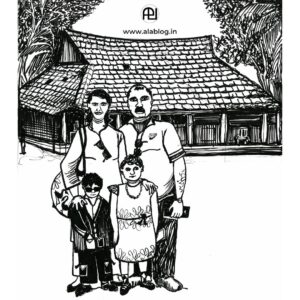Dear Readers,
It is our pleasure to present a fourth-anniversary special issue featuring exciting new voices from our writing workshop. After the very first edition of the Ala Writing Workshop in 2021, we are gratified to have been able to conduct a second edition this year. As before, we focussed on providing confidence and guidance in writing for popular audiences, editing, and in pitching and publicising one’s work. While a majority of this year’s participants were looking to communicate their research to broader audiences, we also had participants with a background in journalistic writing who wished to hone their craft and bring conceptual depth to their work.
This time, we are pleased to present a two-part special issue over this month and next—a fun and engaging spread of short pieces exploring the gamut of architecture, film, sociality, language, and literature in Kerala. In this issue, part 1, Jaya Thampi explores the centrality of Irular folk singer Nanjiyamma’s music to the 2020 film Ayyappanum Koshiyum and the afterlives of this music; Niyati Pavithran introduces readers to a novel architectural project in Kozhikode that reimagines what it means to preserve historical buildings; and Eliza Keyton examines the decline of Malayalam proficiency among students in Kerala and proposes shifts in education policy. The next issue will feature a second set of our workshop participants’ writing. It has been our privilege to support a diverse and talented set of emerging content creators, researchers, and writers as they brainstormed and shaped their ideas into article drafts, and we hope you enjoy the fruits of our collective labour at the workshop.
Here’s hoping that the Ala team can pull off a third edition next year! From moving to writing in Malayalam to engaging with translation, our mind is buzzing with ideas for workshops that will nurture early-stage writers while cementing Ala’s goals–to take a diversity of specialised topics to a broader readership, to feature the work of contributors from all walks of life, and to engage with what it means to be bilingual in our work–bringing together worlds that are too often insulated from one another.
Over the last year, we have also seen some changes within Ala. After three-and-a-half years of being given space on the Kerala Scholars’ server, we finally moved to our own domain and server in the summer of 2022. In some senses, it is a new beginning, while in others, nothing has changed. It gives us more editorial independence and more freedom to experiment with form and content, which we hope to continue to do in the years to come. This year also saw us expanding our team to include two fantastic editors who specialise in Malayalam content and translation. From among a group of highly competent applicants, Susruthan and Sreedevi stood out for their experience in diverse forms of writing in Malayalam, ranging from literary theory to popular blogging. Under their able guidance, we aim to raise the stakes for Malayalam content and translated work on Ala. We are profoundly grateful to ex-editors Sriram V. and Nirmal Roy V. P. for laying down high standards for our content through their editorial work and hope to maintain the same commitment.

Another exciting development is the second season of our podcast series. Having marked a great start with a diverse set of conversations in season 1, we decided to pursue a more thematically focussed approach for season 2, balancing in-depth engagement with accessibility. After exploring various possibilities, we decided to focus on the ideas that popularly mark ‘modernity’, or the condition of being modern, in Kerala. Whereas Kerala’s ‘traditions’ are popularly celebrated as hallowed and inviolable, academics have long pointed out that most of what we define as ‘Keraleeyatha’ today emerged during the churning that happened in the nineteenth and twentieth centuries in Kerala. In other words, a neatly packaged idea of ‘tradition’ is itself the product of modernity. In our ongoing series of conversations, we focus on the violence and erasure inherent to the process of defining tradition and modernity; the diversity of experiences and actors that are silenced in the process. We began with a conversation with T. T. Sreekumar on anti-caste critiques that challenged tradition in Kerala’s medieval literary canon long before colonisation. We then turned to the role and importance of the Indian Ocean in shaping Kerala’s society, where Mahmood Kooria and Dilip Menon together charted an agenda for less terra-centric research on Kerala. In episode 3, we discussed the institutionalisation of ‘Ayurveda’ as Kerala’s singular traditional health system, and the ways in which it has unevenly incorporated diverse indigenous health practices in the last century. As we line up more invigorating conversations for the rest of this year, don’t forget to follow us on Spotify, Pocket Casts or Google Podcasts to be notified of new episodes. Our special thanks to Nidhin Donald for providing an original illustration for the podcast series—a sketch that holds in tension the contradictions of Malayali modernity and the dynamics of caste, class, and religion it entails, shot through with deeply resonant and playful humour, a trademark of Nidhin’s work.
As we grow a year older, we would like to extend our gratitude to our readers, and our patrons who support and encourage and reach out to us via email and social media. We would also not be able to continue the unpaid labour of keeping Ala going without the support of the many contributors who have continued to be generous with their time and ideas. With each passing year, our convictions regarding the aims and aspirations we set out for Ala in 2018 have only grown stronger, and we hope to continue to work towards them over the next year.
For feedback, comments, or to pitch ideas, reach us at contact@alablog.in or give us a shout-out on Twitter, Instagram, or Facebook.
– Aparna, Hari, Shilpa, Sreedevi, Susruthan, and Zeenab
